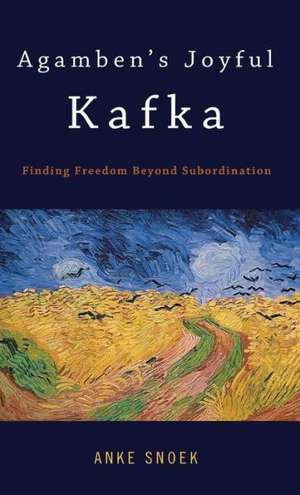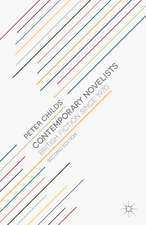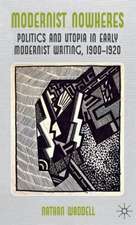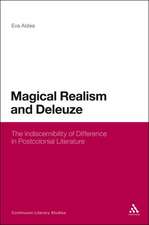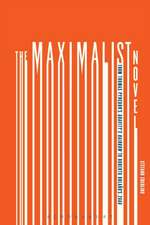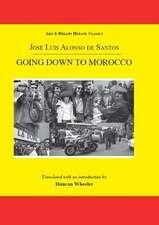Agamben's Joyful Kafka: Finding Freedom Beyond Subordination
Autor Anke Snoeken Limba Engleză Hardback – 5 dec 2012
| Toate formatele și edițiile | Preț | Express |
|---|---|---|
| Paperback (1) | 255.19 lei 43-57 zile | |
| Bloomsbury Publishing – 9 apr 2014 | 255.19 lei 43-57 zile | |
| Hardback (1) | 828.98 lei 43-57 zile | |
| Bloomsbury Publishing – 5 dec 2012 | 828.98 lei 43-57 zile |
Preț: 828.98 lei
Preț vechi: 1063.90 lei
-22% Nou
Puncte Express: 1243
Preț estimativ în valută:
158.63€ • 166.04$ • 132.03£
158.63€ • 166.04$ • 132.03£
Carte tipărită la comandă
Livrare economică 31 martie-14 aprilie
Preluare comenzi: 021 569.72.76
Specificații
ISBN-13: 9781441104892
ISBN-10: 1441104895
Pagini: 160
Dimensiuni: 138 x 216 x 18 mm
Greutate: 0.34 kg
Ediția:New.
Editura: Bloomsbury Publishing
Colecția Bloomsbury Academic
Locul publicării:New York, United States
ISBN-10: 1441104895
Pagini: 160
Dimensiuni: 138 x 216 x 18 mm
Greutate: 0.34 kg
Ediția:New.
Editura: Bloomsbury Publishing
Colecția Bloomsbury Academic
Locul publicării:New York, United States
Caracteristici
The first book to elaborate on Agambenâ?Ts philosophy of political empowerment and freedom
Notă biografică
Anke Snoek is Research Fellow in the Faculty of Arts, Macquarie University, Australia. She has published articles and book chapters on autonomy, freedom, Agamben, Kafka, Foucault and addiction.
Cuprins
Acknowledgements Abbreviations Introduction: Kafka's Hope 1. Strategies in Response to Law (1) 2. Strategies in Response to Law (2) 3. Strategies in Response to Bare Life4. Strategies in Response to the 'Work of Man'5. Strategies in Response to Activism6. Strategies in Response to the Sacrality of Life7. Strategies in Response to Language 8. Strategies in Response to Time (1) 9. Strategies in Response to Time (2)Conclusion: Finding Freedom Beyond Subordination Literature Index
Recenzii
Agamben's Joyful Kafka is valuable both as a work of Agamben scholarship and as a work of Kafka criticism: understanding just how Agamben understands Kafka is extremely useful for finding and opening the joy in Kafka's work, and indispensable for coming to grips with the misunderstandings that have marked Agamben's. [.] Snoek's erudite study makes an important contribution to Agambenian philosophy. It also provides a unique and compelling literary and philosophical study of those moments of reversal which, to quote Benjamin slightly out of context, '. . . can make the incomplete (happiness) complete, and the complete (pain) incomplete.'
One of the greatest questions surrounding Giorgio Agamben's work today is how one might embody his complex conceptualizations of our social and cultural realities. Snoek's answer is quite simple: Kafka's perfectly blended surreal and yet all-too-human literary universe delivers us the most profound and pronounced insights into the highly theoretical work of Agamben. Moreover, as she ably demonstrates, this affinity between Kafka and Agamben is not a coincidence, but a combination of those particular elements central to understanding both authors' visions of our world. Snoek's in-depth analysis probes the darkest corners of modern life alongside two authors whose commentary on such matters almost singularly defines it.
A richly rewarding-and much needed-study of the influence of Kafka in Agamben's work that casts new light on the provocative account of political freedom that he develops.
"Anke Snoek's book fills an existing lacuna in biopolitical theory. Very little in the past generation came close to the explosion of intellectual power that emanated from Benjamin's reading of Kafka, or in ours, to the way Giogrio Agamben reads both. Snoek's comprehensive analysis of these intersections supplies a careful map of both moments for students of the present, and theory of potentialities."
One of the greatest questions surrounding Giorgio Agamben's work today is how one might embody his complex conceptualizations of our social and cultural realities. Snoek's answer is quite simple: Kafka's perfectly blended surreal and yet all-too-human literary universe delivers us the most profound and pronounced insights into the highly theoretical work of Agamben. Moreover, as she ably demonstrates, this affinity between Kafka and Agamben is not a coincidence, but a combination of those particular elements central to understanding both authors' visions of our world. Snoek's in-depth analysis probes the darkest corners of modern life alongside two authors whose commentary on such matters almost singularly defines it.
A richly rewarding-and much needed-study of the influence of Kafka in Agamben's work that casts new light on the provocative account of political freedom that he develops.
"Anke Snoek's book fills an existing lacuna in biopolitical theory. Very little in the past generation came close to the explosion of intellectual power that emanated from Benjamin's reading of Kafka, or in ours, to the way Giogrio Agamben reads both. Snoek's comprehensive analysis of these intersections supplies a careful map of both moments for students of the present, and theory of potentialities."
Descriere
Descriere de la o altă ediție sau format:
The first book to articulate the impact of Kafka on Agamben's thought
The first book to articulate the impact of Kafka on Agamben's thought
